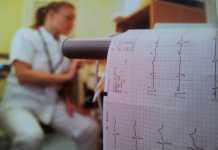December 2004 - Anger and other negative emotions may be triggers for ischemic stroke, according to a study published in the December 14 issue of Neurology, the scientific journal of the American Academy of Neurology.
The study found that people who had strokes were more likely to have experienced anger or negative emotions in the two hours prior to the stroke than at the same time the day before the stroke. They were also more likely to have reacted quickly to a startling event, such as getting out of bed suddenly after hearing a grandchild fall down and cry or standing up from a chair quickly after hearing an unexpected loud noise.
The people were also more likely to have experienced anger, negative emotions, or sudden changes in body position in the two hours before the stroke than they were, on average, in the year before the stroke.
"We know a lot about risk factors that make people more likely to have a stroke in their lifetime, such as smoking and high blood pressure, but until now we haven't had any information on what causes a stroke to occur at a particular time," said study author Silvia Koton, PhD, MOccH, RN, of Tel Aviv University and the Israel Center for Disease Control. "These findings may help us understand how these triggers result in stroke. We can also investigate whether people at a high risk of stroke can make behavior changes. The possibility of preventive medications to lessen the risk of stroke among specific high-risk groups might also be studied."
The study examined 200 people who were hospitalized with an ischemic stroke or a transient ischemic attack (mini-stroke). Ischemic stroke is caused by reduced blood flow to the brain. It is the most common type of stroke.
Continue Reading Below ↓↓↓
The study participants, who had an average age of 68, were interviewed one to four days after the stroke occurred. Approximately 30 percent of patients reported exposure to anger, negative emotions such as fear, irritability, or nervousness, or sudden changes in body position in response to a startling event during the two hours before the stroke. According to the study, exposure to a potential trigger could increase the risk of stroke by as much as 14 times during the two-hour period immediately following exposure.
Levels of anger and other negative emotions were rated on a scale. For example, participants were identified as exposed to anger if they said they had a peak level of anger at a five or higher on a seven-point scale, which was defined as "very angry," "furious," or "enraged."
Researchers don't know how these triggers precipitate a stroke. "It's possible that brief episodes of mental stress cause transient changes in blood clotting and in the function of cells lining blood vessels. It is important to note that our study does not assess the cumulative risk related to exposures to potential triggers but short-term risks during the two-hour period immediately following exposures," Koton said.
Sudden reactions to startling events could trigger stroke through effects on blood circulation or an excessive response by the sympathetic nervous system, which regulates body functions such as heart rate or blood pressure.
The study also examined whether other factors such as positive emotions, heavy physical exertion, and heavy meals were triggers for stroke, and no significant relationship was found.
Other studies have found that anger, negative emotions, sudden changes in body position, and heavy physical exertion may be potential triggers for heart attacks.
"The main modifiable risk factors for stroke are high blood pressure, smoking, diabetes, hyperlipidemia, and obesity. However, this study demonstrates that there are factors that may trigger the premature onset of stroke and this is an important area of potential intervention," said Koton.
Source: American Academy of Neurology









